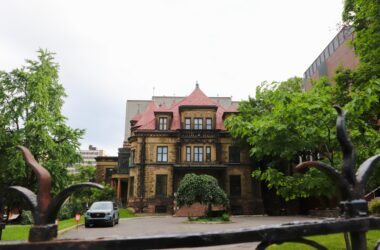Red felt squares dappled McGill’s Y-intersection on Nov. 30, as students gathered to once again protest the Quebec government’s proposed tuition hikes for English-speaking universities. The hikes, announced on Oct. 13, would nearly double fees for out-of-province students at schools like McGill and Concordia from around $9,000 to $17,000 annually. The proposal would also increase international students’ tuition fees to a minimum of $20,000 per year.
According to the Quebec government, the increased fees would go toward funding French-language universities, and the Coalition Avenir Québec (CAQ) has stated that the change is a response to the threatened state of the French language in the province.
McGill has claimed that these hikes would severely jeopardize the university, and has announced an immediate hiring freeze in an attempt to combat the financial impacts. In university-wide messages, Principal and Vice-Chancellor Deep Saini has decried the hikes, stating that they would have far-ranging impacts “from a drop in the number of students and important revenue losses, to devastating consequences for some Faculties and a suspension or re-evaluation of some major infrastructure projects.”
McGill did not reply to The Tribune’s request for comment before the publication deadline.
According to La Presse, the CAQ is now considering implementing a 33 per cent increase for out-of-province students rather than the original near-doubling of fees. The minimum of $20,000 per year for international students would be maintained.
The Students’ Society of McGill University (SSMU), the Quebec Public Interest Research Group at McGill (QPIRG McGill), QPIRG Concordia, and the Concordia Student Union (CSU) collaborated to put on a week of activities and events related to the tuition hikes leading up to Thursday’s protest. On Nov. 27, a petition signed by over 33,000 people was sent to the National Assembly, demanding that the Quebec government rescind the proposed tuition hike.
At the Y-intersection, McGill students gathered around a banner that read “Squarely in the red, Carrément dans le rouge”—a phrase that protesters popularized during mobilizations in 2005 against proposed changes to loans and bursaries for students. The red squares have made multiple comebacks since 2005, including during 2012 student strikes that successfully dissolved proposed tuition hikes. At Thursday’s protest, organizers again handed out red felt squares along with informational flyers to encourage passersby to join the rally.
Protestor Hannah Marder-MacPherson, U2 Science spoke to The Tribune about why she feels that the CAQ’s measures are problematic and threaten the accessibility of education in the province.
“There’s so many students who are working really hard, have got great marks, who have the potential to go off and do great things, who just won’t be able to afford going here [….] I think that’s problematic in a lot of ways, because we already have a huge disparity in terms of wealth and class, especially with access to education,” Marder-MacPherson said.
Many of the individuals protesting were from programs that are disproportionately at risk if the government’s proposed hikes go into effect, including the Schulich School of Music and varsity teams, as both have a large number of out-of-province students.
Joseph Liang, U1 Music and Music Undergraduate Students’ Association VP Internal, voiced his fears for the future of the Music program if the proposed tuition hikes were to go through.
“The faculty council meeting […] projected that we’d lose a ton of funding, we wouldn’t be able to hire new staff, the proportion of graduate students would increase and undergrads would decrease,” Liang said. “I’d like to be able to keep the music school alive because it’s a really vibrant program and we like the way that it contributes to the scene of Montreal cultural life.”
The Tribune spoke with SSMU Vice President (VP) External Liam Gaither at the Y-intersection. Gaither voiced frustration over the lack of student consent in the government’s proposal and explained why the students’ union seeks to mobilize students around accessible education.
“We’re really mobilized on this because we have mandates that continue from the last time that tuition came under threat in 2012 and 2015, and even 2005 and before that,” Gaither said. “Mandates at the SSMU are basically twofold: One is we oppose [non]consensual tuition hikes in any form, and we believe in the work towards free education—that is the eventual goal.”
Gaither expressed that a 33 per cent tuition increase, while smaller, is still unacceptable.
“This is how the CAQ rolls, this is very classic: they put out a massive number, and then they’re like, ‘Okay, maybe we’ll just do it a little bit,’” Gaither said. “They’re hoping that we back off, they’re hoping that we don’t take further action, they’re hoping that we drop our arms now, but we’re not ready to do that, we’re going to continue pushing, because the mandate is not to only let education increase by 30 per cent, the mandate is to fight for free education.”
Shortly after speeches came to a close, the crowd moved toward Sherbrooke to meet with Concordia students that organizers had coordinated with.
As the crowds representing each university merged at the Roddick Gates, The Tribune spoke to Robin Moore, BSc’ 23, who is from Montreal and expressed what he saw as the futility of the CAQ’s proposed tuition changes.
“I don’t think [the tuition hikes] are an effective measure, because the students will just go to schools elsewhere in Canada, and it takes away the opportunity to bring in more people to actually learn French and get engaged in the Quebec culture,” Moore argued. “So if anything, it just takes away the opportunity for [the Quebec government] to expand the French population base in Canada.”
In the merged crowd of about 150, students and professors alike from both universities held signs and banged on pots and pans with spoons as music played. “Solidarité avec les étudiants” was a common chant as the group proceeded down Sherbrooke. “I am Quebecoise and even I am affected,” read one sign.
The Tribune spoke to Concordia students in the crowd; among them was Hannah Jackson, External Affairs and Mobilization Coordinator for the CSU. She reaffirmed the importance of mobilizing against the proposed tuition hikes, and pointed to the ripple effects that the proposal would cause within universities and throughout Montreal.
“A lot of grassroots activist groups—like Solidarity Across Borders, that fight for the rights of undocumented immigrants—they get funding from the universities, they get funding from QPIRGs, they get funding from student grant applications, and so actually, what we reduce [in] the budget of the university will also reduce the budget of the student unions. We will reduce the budget of these fee levies, and then also all of the grassroots community groups that rely on that funding to exist will also be affected,” Jackson said.
Jackson also spoke about the roughly 1,000 Concordia students who are currently on strike over the proposed tuition hikes. Ryan Assaker, a student in Concordia’s School of Community and Public Affairs, is one of them. His department voted to strike from classes on the day of the protest, and has planned for an additional three-day strike from Jan. 31 to Feb. 2.
“I’m a Quebec resident, French is my first language, but […] these measures are austerity hidden behind language rights [….] It’s not actually about language rights.” Assaker said.
The protest ended at the Université du Québec à Montréal (UQÀM), where UQÀM students greeted the Concordia and McGill protesters and welcomed them inside the auditorium for more speeches and warm drinks.
“[The proposed tuition hikes are] going to affect […] the entire fabric of Montreal as a city,” Jackson said. “Because a lot of the vibrancy comes from the multicultural nature of the city, and also the people who come from other places and work and study and contribute to this beautiful city and this province.”









